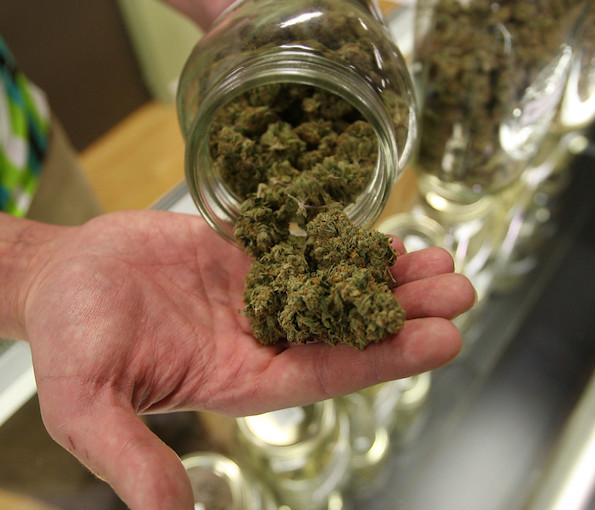Rep. Tulsi Gabbard (D-HI); photo via AFGE
One of the leading tools that opponents of cannabis reform use to discourage public support for legalization is misinformation. Prohibitionists ranging from local cops up to top government officials have been caught out spreading scientifically-discredited myths about cannabis being a “gateway drug,” leading to increased crime rates, or even causing men to grow breasts. This week, a bipartisan coalition of lawmakers has proposed a new attempt to correct this information deficit — the Marijuana Data Collection Act.
This new bill, presented on Tuesday by Reps. Tulsi Gabbard (D-HI) and Carlos Curbelo (R-FL), would require the National Academy of Sciences (NAS) to study "the effects of State legalized marijuana programs on the economy, public health, criminal justice and employment,” Forbes reports. If the bill passes, NAS would have 18 months to publish their initial findings, and would be required to release follow-up reports every two years.
“For decades, bad data and misinformation have fueled the failed War on Drugs that has ruined people’s lives, torn families apart, and wasted billions of taxpayer dollars incarcerating Americans for nonviolent marijuana charges,” Gabbard said, according to Maui Now. “In 2016 alone, nearly 600,000 people were arrested for marijuana possession. Our laws must be informed by facts — not emotion, manufactured stigma and myths.” Gabbard has been a staunch proponent for federal cannabis reform in recent years.
The proposed study would look at states that have fully legalized adult use of cannabis, as well as states that have only legalized medical marijuana. With regards to public health, the study would focus on the impact of legal pot on opioid use and abuse, as well as the effectiveness of cannabis as a medical treatment. The bill would also direct NAS to study the financial impact of legal weed, including the tax revenue collected by states as well as how the states allocated these funds. Researchers would also be tasked with studying the number of jobs that the cannabis industry is creating in these states, including projections for future growth.
The study would also investigate the criminal and social justice impacts of legalization, including the rates of marijuana-related arrests, broken down by race, sex, age, and ethnicity. The NAS would also be required to research whether or not state-level legalization is connected with an increase in traffic fatalities caused by stoned drivers, a hot topic which has not yet been conclusively proven one way or the other. Additionally, researchers would look into the total amount of funding that federal and state governments are spending on prosecuting cannabis offenders.
“This is not a marijuana bill, it is an information bill," NORML political director Justin Strekal said to Forbes. "No member of Congress can intellectually justify opposition to this legislation. Our public policy needs to be based on sound data and science, not gut feelings or fear-mongering. Approving the Marijuana Data Collection Act would provide legislators with reliable and fact-based information to help them decide what direction is most beneficial to society when it comes to marijuana policy.”
“We look forward to a study conducted by an independent federal agency that isn’t invested in continuing marijuana prohibition,” said Aaron Smith, executive director of the National Cannabis Industry Association, according to Maui Now. “Lawmakers and regulators at the state and federal level will benefit from a serious look at the effects of making cannabis legal for medical and adult use. There is already plenty of evidence showing that regulation is working in the states, but we need to look at the potential public health and economic impacts of further reforms, and the real costs of continuing to ban a substance that research shows may be helping to reduce the damage caused by the opioid problem.”
The new bill is one of many cannabis-related measures to appear before Congress this year, and may have the greatest chance of success, as it is by far the most conservative of the lot. The bill only asks the federal government to research legalization, and would not directly reform federal cannabis laws in any way. This summer, senators proposed two more comprehensive bills: Chuck Schumer's Marijuana Freedom and Opportunity Act, which would decriminalize cannabis at the federal level, and Elizabeth Warren and Cory Gardner's STATES Act, which would officially allow individual states to choose whether or not to legalize medical or recreational pot without fear of federal interference. The Marijuana Justice Act would go even further, by completely legalizing cannabis nationwide.
Although congressional support for cannabis reform has been growing over the past decade, Republican leadership remains strongly opposed to legalization. Over the past two years, Rep. Pete Sessions has used his power as chairman of the House Rules Committee to block over 34 cannabis-related bills from advancing to debate, including bills to allow veterans access to medical marijuana, and protections for state-legal medical cannabis programs as well as banks willing to serve the cannabis sector. Hopefully this new bill can avoid the same fate.











